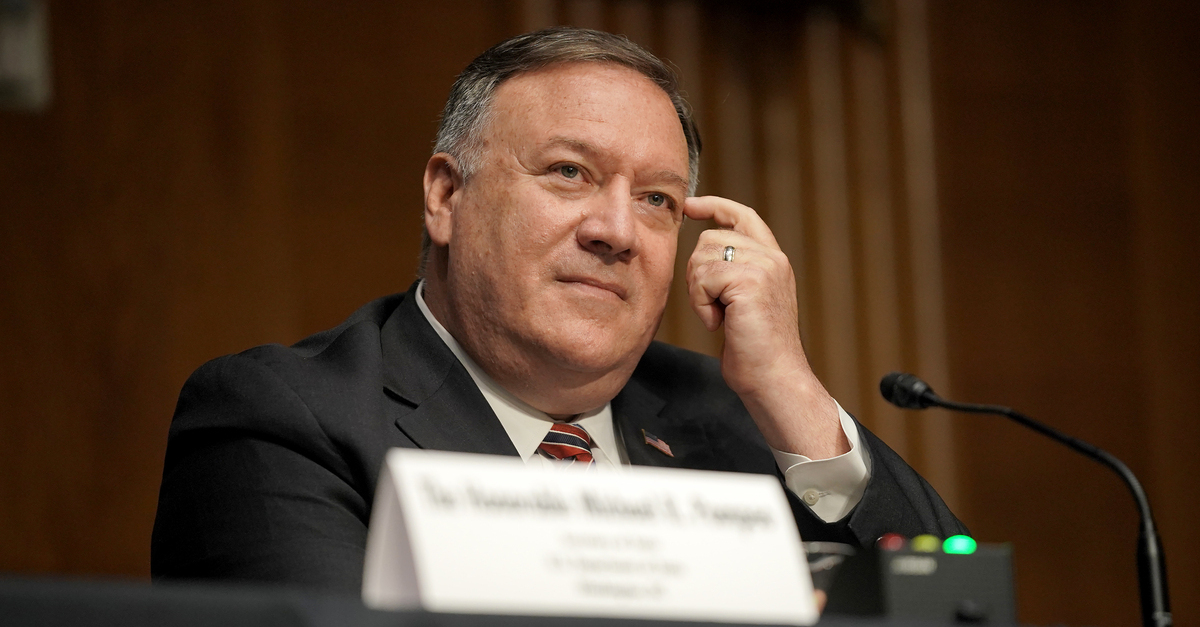
President Donald Trump‘s baseless Thursday morning question about postponing the 2020 general election has been given new life. Secretary of State Mike Pompeo suggested the final decision on any such postponement hinges upon whether Attorney General Bill Barr and others at the U.S. Department of Justice (DOJ) can find a legal justification to change the date.
“Can a president delay the November presidential election, Mr. Secretary?” Sen. Tim Kaine (D-Va.) asked during a Senate hearing.
“Senator, I’m not going to enter a legal judgment on that on the fly this morning,” Pompeo replied.
A somewhat stunned Kaine then went on to run through all of Pompeo’s legal bona fides and allegedly merit-based achievements–while noting that he, too, attended Harvard Law School.
“You are one of the most highly trained and accomplished lawyers who are part of this administration,” Kaine summarized, “Can a president delay a presidential election?”
To which Pompeo replied:
In the end, the Department of Justice, and others, will make that legal determination. We all should want–I know you do, too, Senator Kaine–want to make sure to have an election that everyone is confident in.
“Are you indifferent to the date of the election?” Kained asked.
“It should happen lawfully,” Pompeo said–the end of his thoughts on the matter.
Legal experts fumed about and dismissed Pompeo’s suggestion.
“The Constitution gives Congress the power to set a date for the election, Congress has already set a date, and the states are going to run the election process like every other cycle,” national security attorney Bradley P. Moss told Law&Crime in an email. “DOJ can issue all the opinions it wants and the President can issue all the tweets he wants: it changes nothing.”
University of Texas Law Professor Steve Vladeck was a bit more animated in his response.
“NO. THEY. WON’T,” he tweeted in response to Pompeo’s suggestion that DOJ officials will be the final arbiters on the issue.
“Congress already made it in 3 U.S.C. § 1,” Vladeck noted–before citing the law on point here. “‘The electors of President and Vice President shall be appointed, in each State, on the Tuesday next after the first Monday in November, in every fourth year succeeding every election of a President and Vice President.'”
Pompeo’s remarks were characterized as cautious or evasive by some media outlets; however, some experts saw the secretary of state’s response in a bit more sinister light.
“This is *not* a dodge,” noted trial attorney Max Kennerly. “It’s an erroneous, authoritarian answer. Neither the Department of Justice nor ‘others’ make the ‘legal’ determination of if the Presidential election is delayed. States run their elections, Congress decided the date for elector appointment (3 USC § 1).”
At least one legal expert took a wait-and-see approach to Pompeo’s contribution to the debate.
“Because this is not a thing he can do unilaterally or lawfully, the Justice Department should disclose any formal advice or guidance to the contrary,” legal writer Cristian Farias mused. “The president floating an election delay not only creates confusion; it’s akin to misinforming the public and suppressing voters. That determination may already exist. If so, we need to see it, whether it embarrasses the president or not.”
[image via Greg Nash-Pool/Getty Images]
Editor’s note: This piece has been corrected to reflect that the president’s statements were Thursday, rather than Wednesday, as originally and inaccurately stated. We regret mixing up the days.
Have a tip we should know? [email protected]